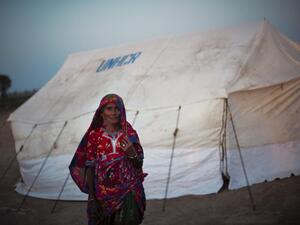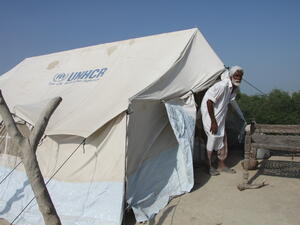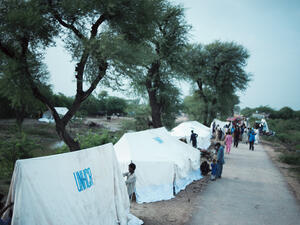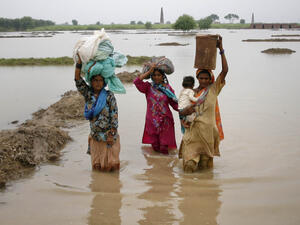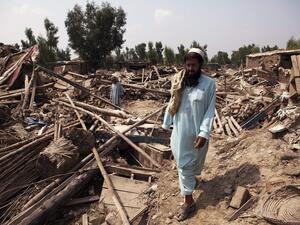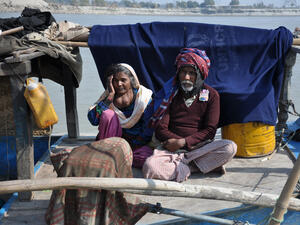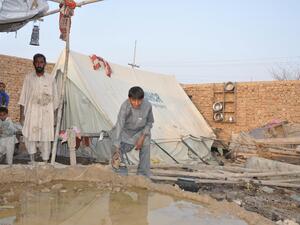UNHCR concerned about Afghan refugees as Pakistan crisis deepens
UNHCR concerned about Afghan refugees as Pakistan crisis deepens
UNHCR is increasingly concerned about the plight of flood-affected Afghan refugees in Pakistan, some of whom are now under pressure to repatriate by speculators around Peshawar seeking to develop land that until now has been occupied by refugee settlements.
With 1.7 million Afghan refugees, Pakistan has one of the world's largest refugee populations. More than 1.5 million of these are in affected provinces, dozens of Afghan refugee villages have been damaged, and several are completely destroyed. In Khyber Pakhtunkwa province alone, more than 12,000 dwellings in refugee villages have been swept away leaving almost 70,000 people homeless.
Many of the Afghan refugee settlements in Pakistan were established some 30 years ago after the Soviet invasion of Afghanistan triggered the first wave of refugees. At the time the settlements were in remote areas or on the edges of cities. Over the years, the land has become more valuable as cities have grown.
UNHCR welcomes the assurances from federal authorities that all people affected by the floods should be able to return to their homes to rebuild, including Afghan refugees. The Ministry of State and Frontier Regions and the Chief Commissioner for Afghan Refugees have also given assurances refugees have the right to return to their dwellings. We hope that local arrangements can be made quickly to ensure the spirit of this commitment cascades down to all levels, and moves by land speculators are stymied.
One of the worst hit refugee villages has been Azakheil in Nowshera district in Pakistan's northwest. Here more than 23,000 people lost homes. A UNHCR technical team is on its way today to assess the feasibility of rebuilding on the site. Over the next days, the provincial government is expected to decide whether the village can be rebuilt on the same site or whether residents will have to relocate to another settlement in the same district.
In the damaged refugee camps around Peshawar, Afghans are picking through the mud trying to salvage what they can from their homes. Most have sought shelter elsewhere for the moment, and are scattered in surrounding communities with relatives or in makeshift shelters. Since the floods hit at the end of July, UNHCR has distributed tents and other shelter supplies - for example, cooking sets and sleeping materials - to the worst-hit families. We are also preparing to rebuild infrastructure including schools, health points and water and sanitation facilities in refugee villages and surrounding communities in cooperation with local authorities and humanitarian partners.
Meanwhile, the overall flood situation in Pakistan and our response is becoming increasingly complex as we respond on a number of fronts. Our focus continues to be the provinces of Khyber Pakhtunkwa and Balochistan where we have an existing strong field presence. Balochistan is now hosting more than a million people displaced by flood waters, including more than 600,000 fleeing Jacocabad and other towns in neighbouring Sindh. As one of the few humanitarian agencies with a field presence in this remote part of Pakistan, UNHCR, alongside the ICRC, has been asked to lead the international relief effort in the province.
UNHCR is also being asked to take on a larger role in the south of the country, and is extending its technical expertise to local authorities in Sindh who have set up tented camps in Karachi and Sukkur. In recent days, UNHCR has sent specialist camp coordination and camp management staff to Karachi and Sukkur to help advise local officials on managing the temporary sites until people can return, with their tents, to their homes. The overall management of the camps remains with the Pakistani authorities.
With the continued growing needs in Pakistan and its expanding role in flood response, UNHCR is currently revising its initial appeal of $41 million. The new appeal is expected to be released in the next few days.

